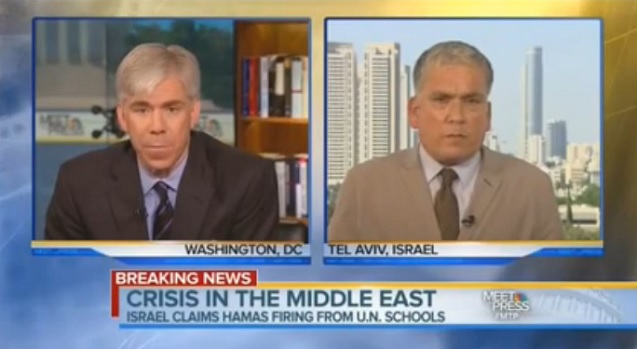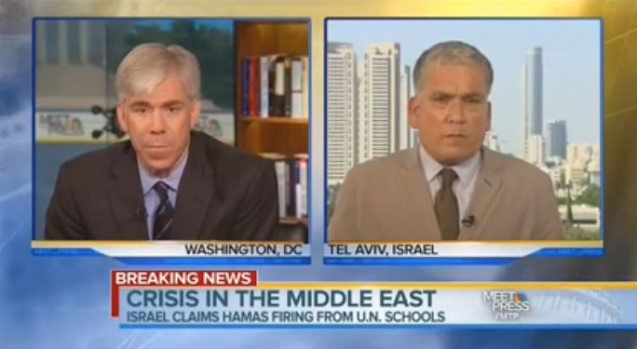
 via YouWatchMedia )” width=”637″ height=”349″ />NBC host David Gregory was forced to issue a correction at the end of his weekly “Meet the Press” program last month after a United Nations official confronted him for using an unconfirmed Israeli video that allegedly showed Hamas shooting rockets from a UN school. (Screen grab via YouWatchMedia )
via YouWatchMedia )” width=”637″ height=”349″ />NBC host David Gregory was forced to issue a correction at the end of his weekly “Meet the Press” program last month after a United Nations official confronted him for using an unconfirmed Israeli video that allegedly showed Hamas shooting rockets from a UN school. (Screen grab via YouWatchMedia )
It’s time to bring back a Washington institution.
Yesterday, Politico’s Mike Allen broke the news that Chuck Todd, NBC’s political director and chief White House correspondent, is the favorite to replace David Gregory and take over the helm at “Meet The Press.”
An official announcement on the switch is expected to be made in the next few weeks according to Allen.
Of course, this news doesn’t really come as a surprise to anyone who’s been watching “Meet The Press” of late.
Ever since the death of Tim Russert in 2008, “Meet the Press” has floundered, often finding itself at the bottom of the Sunday news show ratings.
In fact, the show has seen some of its worst ratings ever under David Gregory.
As a change looms at “Meet the Press,” it’s worth taking a look at how this once great pillar of political news television has ended up at the bottom of the ratings barrel, and how it can be made great again.
And to be fair, it’s not all David Gregory’s fault. Simply swapping him out for Chuck Todd won’t right the ship.
One of the major problems with “Meet The Press” of late is that the show assumes that its audience is not following the news, and has no clue about the week’s events.
But, as Jason Linkins points out over at The Huffington Post, the majority of the people that tune into “Meet the Press” are “well-versed in the stories of the week,” and have, “already absorbed the talking points of the major players, availed themselves of a wealth of insight and expertise, and have even participated in their own discussions on current events.”
Basically, the show’s producers appear to think its viewers are a lot dumber and a lot more uninformed than they actually are.
So, when people tune in on Sundays and hear the same old talking points from the same old pundits and politicos, they get bored and change the channel.
As Linkins puts it, “One doesn’t get the sense that the producers of ‘Meet The Press’ have in any way accounted for the sophistication of the show’s potential audience.”
And, since the show underestimates its audience, it brings on guests who really can’t contribute much to serious debates.
Similarly, the show rarely brings on experts on individual issues. Instead, it relies on political pundits, strategists, and analysts who are just reciting either bumper stickers or conventional wisdom.
That leads to a lot more “spin” on the issues, and fewer insightful discussions and debates.
The result is that big-name guests are thrown softball questions, instead of the hard-hitting grillings that the show was known for back in its early days.
Believe it or not, there was a time on “Meet The Press” when lawmakers who went on the show weren’t given the red-carpet treatment.
Instead, regardless of their political affiliations, they were barraged with questions, and often made to feel uncomfortable, all in the name of enlightening the American people.
So, those are some of the major problems that have dragged “Meet the Press” down in recent years.
Luckily, the show can be salvaged, and once again be a leader in political news television.
First, the show’s producers have to stop laying out the red-carpet for politicians who appear on the show.
It’s all about “access” to politicians – and because politicians have succeeded in intimidating the media, the producers are more concerned with maintaining relationships with politicians than they are with holding them accountable.
Going on “Meet the Press” shouldn’t be a walk in the park. Lawmakers and guests should be grilled, and if they feel uncomfortable, that’s a good thing.
Guests should be challenged on their beliefs and stances, so that the American people can have a well-rounded view of what’s really going on.
Look at a show like BBC’s “HARDtalk.” Instead of asking guests fluff questions and worrying about maintaining relationships, “HARDtalk” brings on some of the biggest names in politics, and still manages to hold their feet to the fire.
And right here on “The Big Picture,” I love getting into serious debates with big names, which illustrate the political issues involved.
I recently had Pat Buchanan on the show. Buchanan is still arguably one of the biggest names in Washington, and yet I made sure to ask him some tough questions and to hold him accountable for his beliefs.
If I can do it, “Meet The Press” can do it.
Next, instead of asking the same old beltway regulars the same old questions, and relying on boring panels, “Meet The Press” should be talking to experts on the issues, even if it means abandoning their current format, and doing more longform interviews and debates.
Look at Amy Goodman’s “Democracy Now!” for example, which dives deep into the issues that Americans really care about. Amy does longform interviews with expert guests and has serious discussions that cut through the “spin”, and that’s why “Democracy Now!” has been so successful.
And right here on “The Big Picture,” we consistently engage in deep discussions on the issues that matter with experts on those issues. Just last night we talked to three of the brightest minds on the current crisis in Iraq.
“Meet The Press” has definitely declined over the years, and today it’s just a shell of what it used to be.
But it can get back to being the Washington institution it once was.
When it comes to Sunday news shows, and really any news shows for that matter, Americans want a thoughtful analysis from a broad diversity of sources.
So, “Meet The Press,” give us a program that’s worth watching and we’ll watch it!
Truthout Is Preparing to Meet Trump’s Agenda With Resistance at Every Turn
Dear Truthout Community,
If you feel rage, despondency, confusion and deep fear today, you are not alone. We’re feeling it too. We are heartsick. Facing down Trump’s fascist agenda, we are desperately worried about the most vulnerable people among us, including our loved ones and everyone in the Truthout community, and our minds are racing a million miles a minute to try to map out all that needs to be done.
We must give ourselves space to grieve and feel our fear, feel our rage, and keep in the forefront of our mind the stark truth that millions of real human lives are on the line. And simultaneously, we’ve got to get to work, take stock of our resources, and prepare to throw ourselves full force into the movement.
Journalism is a linchpin of that movement. Even as we are reeling, we’re summoning up all the energy we can to face down what’s coming, because we know that one of the sharpest weapons against fascism is publishing the truth.
There are many terrifying planks to the Trump agenda, and we plan to devote ourselves to reporting thoroughly on each one and, crucially, covering the movements resisting them. We also recognize that Trump is a dire threat to journalism itself, and that we must take this seriously from the outset.
Last week, the four of us sat down to have some hard but necessary conversations about Truthout under a Trump presidency. How would we defend our publication from an avalanche of far right lawsuits that seek to bankrupt us? How would we keep our reporters safe if they need to cover outbreaks of political violence, or if they are targeted by authorities? How will we urgently produce the practical analysis, tools and movement coverage that you need right now — breaking through our normal routines to meet a terrifying moment in ways that best serve you?
It will be a tough, scary four years to produce social justice-driven journalism. We need to deliver news, strategy, liberatory ideas, tools and movement-sparking solutions with a force that we never have had to before. And at the same time, we desperately need to protect our ability to do so.
We know this is such a painful moment and donations may understandably be the last thing on your mind. But we must ask for your support, which is needed in a new and urgent way.
We promise we will kick into an even higher gear to give you truthful news that cuts against the disinformation and vitriol and hate and violence. We promise to publish analyses that will serve the needs of the movements we all rely on to survive the next four years, and even build for the future. We promise to be responsive, to recognize you as members of our community with a vital stake and voice in this work.
Please dig deep if you can, but a donation of any amount will be a truly meaningful and tangible action in this cataclysmic historical moment.
We’re with you. Let’s do all we can to move forward together.
With love, rage, and solidarity,
Maya, Negin, Saima, and Ziggy